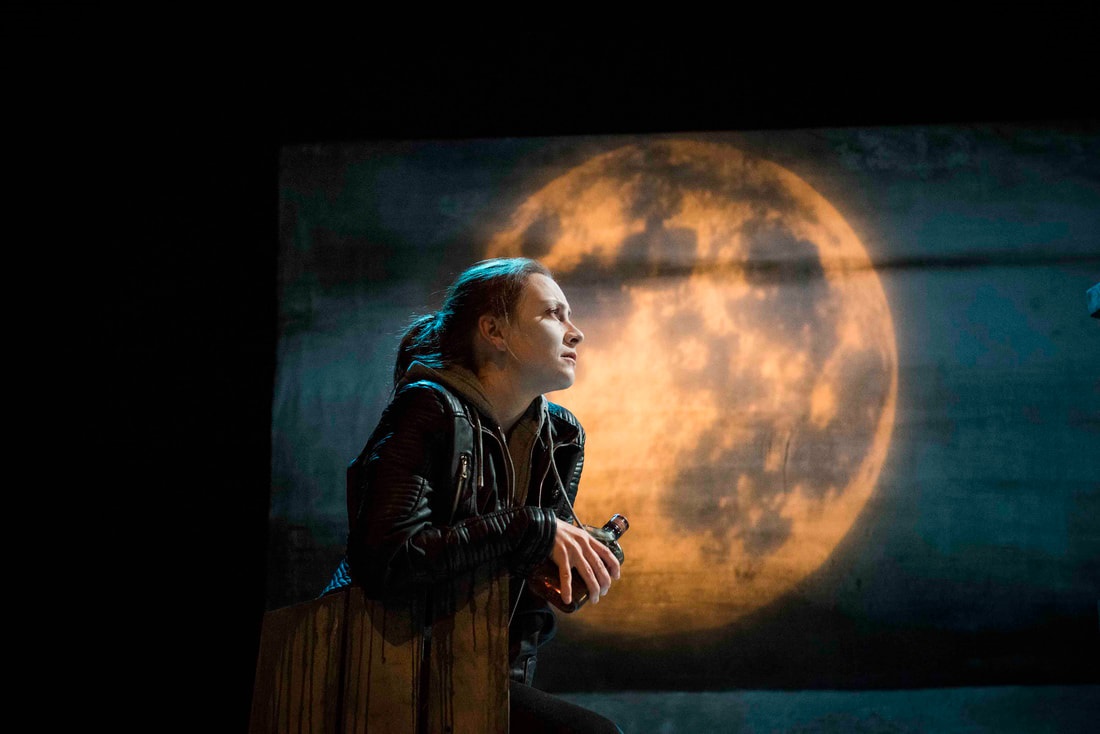Kevin MacNeil’s 2005 critically acclaimed novel, The Stornoway Way, has been adapted by Dogstar Theatre Company for the stage. Marketed as a tragicomedy, it follows the eponymously named Roman Stornoway (Naomi Stirrat), a former busker and wannabe musician, and his pal, Eilidh (Rachel Kennedy). The pair is desperate to leave the narrow all-seeing island life that is ‘…less the back of beyond – more the centre of beyond’, yet they are shackled to it by the twin problems of alcohol dependence and their conflicting feelings about belonging there. Thanks to Eilidh’s more positive outlook, they finally make their way to Edinburgh. Here Roman meets and falls for Hungarian student Eva (Chloe-Ann Tylor) but his old bevvying ways manage to stymie any hopes of a different life.
The cast of three young female actors, who give strong performances throughout, immediately break the fourth wall as each states their character’s name then their own, drawing attention to the production’s gender-blind casting. What follows is a series of scenes that move the narrative forward, with Kennedy and Tylor taking on smaller roles. These scenes are peppered with Gaelic songs written by MacNeil, Willie Campbell and Colin Macleod, which are pleasantly sung by the cast. English surtitles appear on a video screen where Jim Hope has created atmospheric sea scenes behind Ali Maclaurin’s simple set of blue and grey bathed driftwood.
Matthew Zajac, renowned for his legendary The Tailor of Inverness, brings canny direction to the necessarily small space. The island characters are caught between the double pillars of kirk and state – the state of inebriation, that is. The all-consuming presence of alcohol permeates the play like a negative drip reflecting the adverse relationship Scotland has with alcohol. The sexless love scene, while symbolic and poetic, manages to hold a whiff of puritanism, whether wittingly or not.
Writer MacNeil is aware that a novel can only do so much and believes that ‘novels offer lies that reveal bigger truths’. Though he has opted for this version of island life, he knows it is not a definitive one. It is important to shed light on this ‘curtain twitchy’ place but in reality it is something that is as fiercely felt in any wee toun as it is on an island. What matters is that the work puts the Isles in focus, giving actors and other crew members from the region the chance to be part of a production representing their home and heritage, something Dogstar specialises in.
Other than that, however, The Stornoway Way doesn’t break new ground in a theatrical sense. A few corny jokes are told throughout the narrative, but the humour isn’t strong enough to get past those in the know about island life. Perhaps drawing too much for its literary source material, the performance comes across more as an elaborate piece of storytelling rather than a play.
While there are a number of rewarding qualities behind Dogstar’s production, they’ve not found their way just yet with this one.
